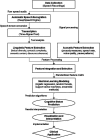Protocol for detection and monitoring of post-stroke cognitive impairment through AI-powered speech analysis: a mixed methods pilot study
- PMID: 40376094
- PMCID: PMC12078268
- DOI: 10.3389/fnagi.2025.1581891
Protocol for detection and monitoring of post-stroke cognitive impairment through AI-powered speech analysis: a mixed methods pilot study
Abstract
Introduction: Post-stroke cognitive impairment (PSCI) affects up to 75% of stroke survivors but remains challenging to detect with traditional neuropsychological assessments. Recent advances in artificial intelligence and natural language processing have opened new avenues for cognitive screening through speech analysis, yet their application to PSCI remains largely unexplored. This study aims to characterize speech markers of PSCI in the first-year post-stroke and evaluate their utility for predicting cognitive outcomes in a Singapore cohort.
Methods: This prospective mixed-methods study will recruit 30 stroke survivors from the Alexandra Hospital and National University Hospital in Singapore. Participants will be assessed at four timepoints: baseline (within 6 weeks of stroke onset), 3-, 6-, and 12-months post-stroke. At each visit, participants will complete the Montreal Cognitive Assessment (MoCA) and a standardized speech protocol comprising picture description and semi-structured conversation tasks. Speech recordings will be automatically transcribed using automated speech recognition (ASR) systems based on pretrained acoustic models, and comprehensive linguistic and acoustic features will be extracted. Machine learning models will be developed to predict MoCA-defined cognitive impairment. Statistical analysis will include correlation analysis between speech features and MoCA scores, as well as machine learning classification and regression models to predict cognitive impairment. Linear mixed-effects models will characterize trajectories of MoCA scores and speech features over time. Qualitative analysis will follow an inductive thematic approach to explore acceptability and usability of speech-based screening.
Discussion: This study represents a critical step toward developing speech-based digital biomarkers for PSCI detection that are sensitive, culturally appropriate, and clinically feasible. If validated, this approach could transform current models of PSCI care by enabling remote, frequent, and naturalistic monitoring of cognitive health, potentially improving outcomes through earlier intervention.
Keywords: cognitive screening; digital biomarkers; machine learning; mixed methods; natural language processing; post-stroke cognitive impairment; speech analysis.
Copyright © 2025 Shankar, Chew, Bundele and Mukhopadhyay.
Conflict of interest statement
The authors declare that the research was conducted in the absence of any commercial or financial relationships that could be construed as a potential conflict of interest.
Figures
References
-
- Ahlawat H., Aggarwal N., Gupta D. (2025). Automatic speech recognition: a survey of deep learning techniques and approaches. Int. J. Cognit. Comput. Engin. 6, 201–237. doi: 10.1016/j.ijcce.2024.12.007 - DOI
-
- Alhanai T., Au R., Glass J. (2017). Spoken language biomarkers for detecting cognitive impairment. In 2017 IEEE automatic speech recognition and understanding workshop (ASRU). 409–416.
LinkOut - more resources
Full Text Sources



